印度建筑的减排潜力
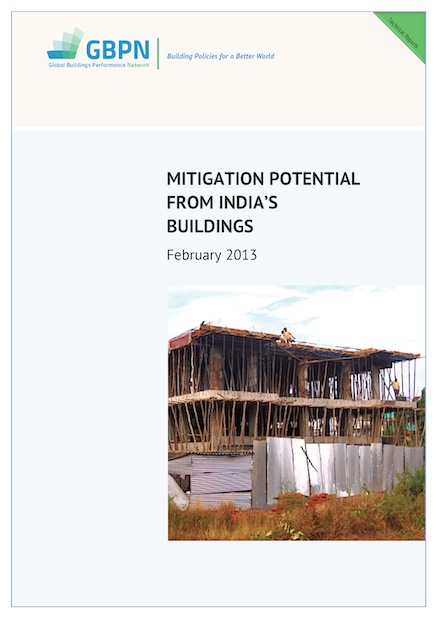 可靠证据表明,至2050年印度建筑领域会产生巨幅能源增长,基于此估测,本报告分析了印度目前建筑节能减排的政策框架及其节能潜力。
可靠证据表明,至2050年印度建筑领域会产生巨幅能源增长,基于此估测,本报告分析了印度目前建筑节能减排的政策框架及其节能潜力。
26 result(s) found
 可靠证据表明,至2050年印度建筑领域会产生巨幅能源增长,基于此估测,本报告分析了印度目前建筑节能减排的政策框架及其节能潜力。
可靠证据表明,至2050年印度建筑领域会产生巨幅能源增长,基于此估测,本报告分析了印度目前建筑节能减排的政策框架及其节能潜力。
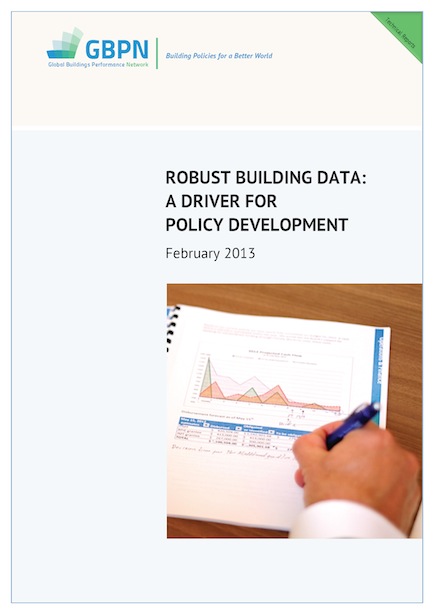 本报告就四个地区数据质量和数据的可利用性问题进行了分析,同时也提醒了我们需要完成多少工作才能建成一个强大而全面的建筑数据库,并提出了实现这个数据库的可行性建议。
本报告就四个地区数据质量和数据的可利用性问题进行了分析,同时也提醒了我们需要完成多少工作才能建成一个强大而全面的建筑数据库,并提出了实现这个数据库的可行性建议。
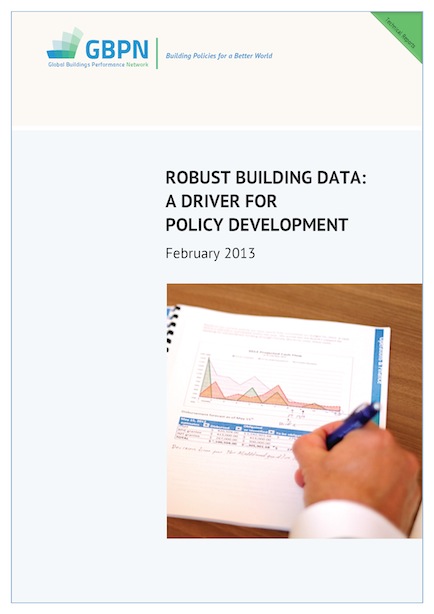 本报告就四个地区数据质量和数据的可利用性问题进行了分析,同时也提醒了我们需要完成多少工作才能建成一个强大而全面的建筑数据库,并提出了实现这个数据库的可行性建议。
本报告就四个地区数据质量和数据的可利用性问题进行了分析,同时也提醒了我们需要完成多少工作才能建成一个强大而全面的建筑数据库,并提出了实现这个数据库的可行性建议。
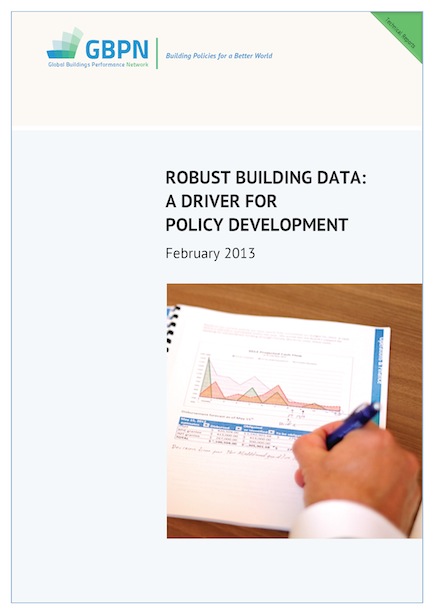 Data Annex
Data Annex
Discover where things stand regarding building energy data quality and availability in our four regions, this report reminds us of how far we have to go before a robust and comprehensive set of building data is in place and provides some recommendations of how we can get there.
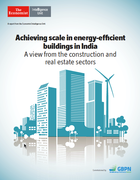 The Economist Intelligence Unit (EIU) report "Achieving scale in energy-efficient buildings in India: A view from the construction and real estate sectors" commissioned by the GBPN explains the challenges and opportunities of investing in energy efficiency in buildings in India.
The Economist Intelligence Unit (EIU) report "Achieving scale in energy-efficient buildings in India: A view from the construction and real estate sectors" commissioned by the GBPN explains the challenges and opportunities of investing in energy efficiency in buildings in India.
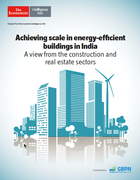 A report from the Economist Intelligence Unit (EIU), commissioned by the GBPN finds that while India’s commercial building sector has blazed the energy-effiency trail in the building sector, achieving significant scale will depend on efficiency measures becoming standard practice in the commercial middle market, retrofit and, particularly, the residential building segment.
A report from the Economist Intelligence Unit (EIU), commissioned by the GBPN finds that while India’s commercial building sector has blazed the energy-effiency trail in the building sector, achieving significant scale will depend on efficiency measures becoming standard practice in the commercial middle market, retrofit and, particularly, the residential building segment.
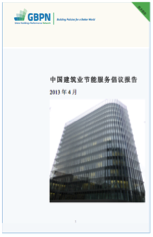 Executive Summary
Executive Summary
GBPN conducted a study on the factors affecting the use of ESCO models for the retrofit of existing buildings in China, identifying current barriers to the development of the Chinese ESCO market, while also researching best-practice examples of ESCOs globally and investigating the feasibility of introducing those examples to China.
Around the world, engineers, architects and policymakers have been exploring ways to deliver highly efficient buildings whose reduced energy demand is satisfied by clean, renewable energy. Building off of the broader concept of a green or sustainable building, the concept of the “net zero building” focuses on the energy dynamics and performance of the building. And as policymakers and leaders align toward the net zero concept, the focus on achieving deep energy efficiency has centered on integrated technologies as well as ways to connect buildings to the natural environment.
Improving residential energy efficiency is widely recognised as one of the best strategies for reducing energy demand, combating climate change, and increasing security of energy supply. However, progress has been slow to date due to a number of market and behavioural barriers that have not been adequately addressed by energy efficiency policies and programmes. This study is based on updated findings of the European Futures for Energy Efficiency Project that responds to the EU Horizon 2020 Work Programme 2014–2015 theme ‘Secure, clean and efficient energy’.
The building sector is not on track to lower total greenhouse gas emissions. Given that emissions from the sector represent nearly 40% of global energy-and process-related emissions, this represents a serious challenge to keeping global warming to 1.5oC. The Buildings sector must therefore decarbonize.To support this goal, this report focuses on policy drivers for decarbonisation, and the costs and benefits associated with their implementation.
A JRC workshop on split incentives organised in the framework of article 19(1)(a) of the Energy Efficiency Directive (Directive) has been organised in order to examine current solutions addressing split incentives in the building sector in Europe and beyond. The workshop focused on the social housing, private residential and commercial sectors. Practices from Italy, the Netherlands, the UK, Denmark, Sweden and the US were presented and a panel discussion between representatives from groups of landlords, tenants, social housing and ESCOs was held.
Residential buildings use approximately 20 percent of the total U.S. energy consumption, and single-family homes alone account for about 16 percent. Older homes are less energy efficient than newer ones, and, although many experts have identified upgrades and improvements that can yield significant energy savings at relatively low costs, it has proven to be difficult to spur most homeowners into making these investments.
The gap between actual carbon prices and those required to achieve ambitious climate change mitigation could be closed by enhancing the public acceptability of carbon pricing through appropriate use of the revenues raised. In this Perspective, we synthesize findings regarding the optimal use of carbon revenues from both traditional economic analyses and studies in behavioural and political science that are focused on public acceptability.
Belt and Road Initiative (BRI) countries are major energy producers and consumers in the world, and they have enormous potential for energy cooperation, energy saving, and CO2 emissions reduction due to their various resource endowments. However, little quantitative research has been conducted under the BRI in the same framework.
This paper analyses the field of innovation studies regarding barriers to low-carbon innovation and consequences for finance (investment and divestment) and contributes to a more holistic understanding of the underlying mechanisms. A combination of technological barriers combined with economic barriers, institutional and political barriers contribute to suboptimal low-carbon investment all along the innovation cycle. Policy makers need to take a systemic approach to enable the redirection of diverse private financial sources.
Municipal policies can reduce greenhouse gas emissions and help to mitigate climate change. It is often unclear why cities would adopt such policies, however, given that the benefits from climate mitigation will be felt globally, rather than exclusively locally. Studies have identified a rationale for urban mitigation and energy policies rooted in local co-benefits, such as improvements in local environmental quality or job creation. Here we explore the possibility of financial co-benefits: whether municipal climate policies lead to an enhanced creditworthiness.
Contemporary societies are facing a broad range of challenges, from pressures on human health and well-being to natural capital depletion, and the security of food, water and energy. These challenges are deeply intertwined with global processes, such as climate change and with local events such as natural disasters. The EU's research & innovation (R&I) policy is now seeking to address these challenges from a new perspective, with Nature-Based Solutions, and turn them into innovation opportunities that optimise the synergies between nature, society and the economy.